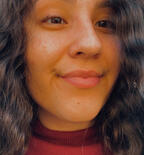Taa Machiria Salazar
Graduate Student
Taa Machiria (Taa’a) Salazar is a first-year doctoral student and a first-generation Yaqui scholar with roots in Guadalupe, Arizona, and Indio, California. They graduated from the University of California, Berkeley, in 2023 with honors in English and Native American Studies and were the recipient of the Departmental Citation in Ethnic Studies their graduating year. As an undergraduate, they produced research projects centered on Native American women’s literature post-the 1970s, the period during which prominent authors, such as Louise Erdrich and Linda Hogan, began to center women’s experiences under settler colonialism. Through an examination of contemporary Native women’s written works, they sought to investigate the gendered dimensions of the settler-colonial project as they continue to manifest both within and beyond Native communities.
As a doctoral student, they intend to expand on their previous research and explore the lives and broader cultural productions of contemporary (late-20th/early-21st-century) Native women and Two-Spirits (queer Natives) navigating the gender, sexual, and racial dynamics created by settler colonialism. To conduct more comprehensive research, they plan to extend their attention to visual arts (ceramics, beadwork, photography, etc.), as well as literature, and incorporate oral histories and interviews where possible. A second research interest centers on Taa Machiria’s own Yaqui community, especially Yaqui women, who have hitherto received inadequate attention in scholarship and elsewhere. More specifically, they hope to explore the role of Yaqui matriarchs in fortifying community against legacies of genocide in the United States and Mexico by examining how they engage the social and political world, represent culture and history, and preserve language and tradition. In their personal and professional pursuits, Taa’a is ultimately motivated by a commitment to advancing the self-determination of Yaqui and broader Native American communities, as well as those similarly situated under settler colonialism.
Currently, they are assisting with the Yoeme (Yaqui) Language Project headed by César Barreras at the University of California, Los Angeles. Helping to coordinate and conduct interviews with diasporic Yaqui language learners, they have enjoyed witnessing and learning about how research may function as a means of strengthening community and advocating for reparations.
Colonization and decolonization; late-20th/early-21st-century Native America; Native American/Indigenous linguistic and cultural revitalization; Yaqui studies; Indigenous feminism; queer Indigeneity; community-based organization and advocacy
